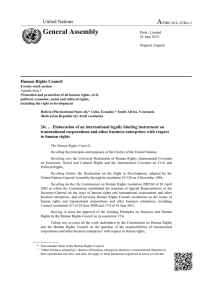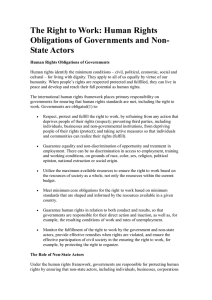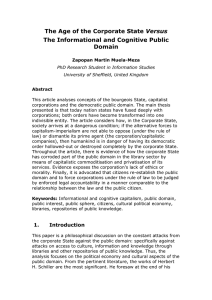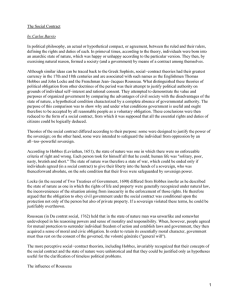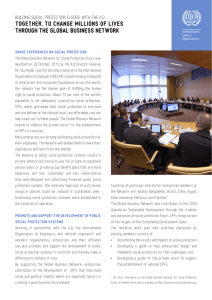contextualising the state duty to protect human rights as defined in
Anuncio
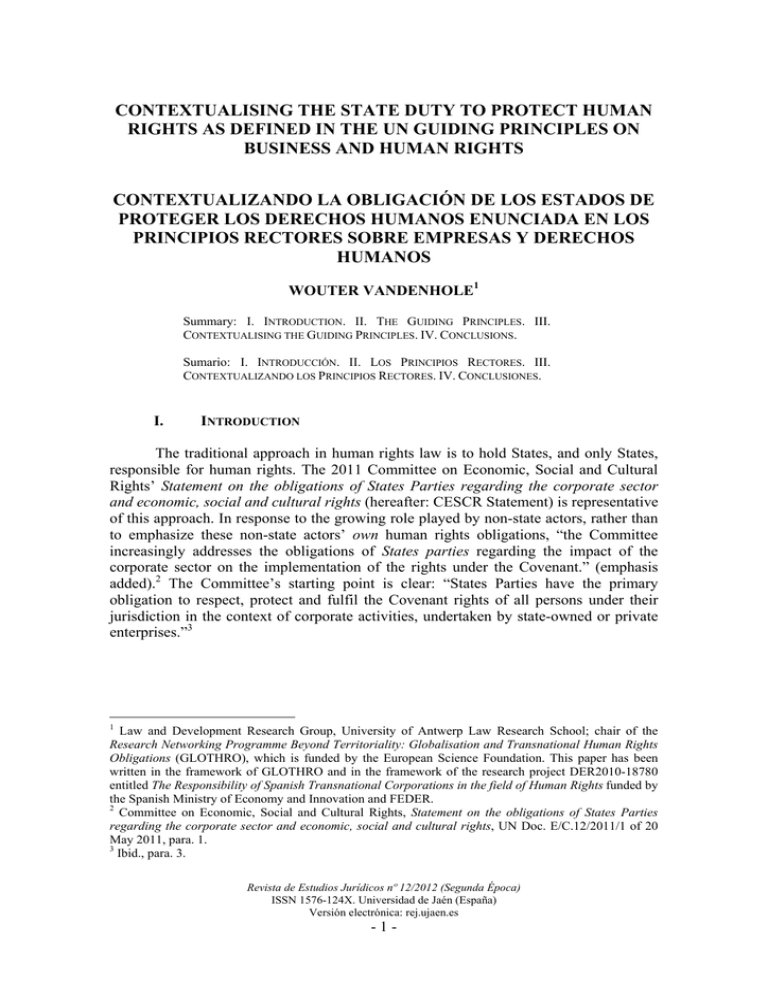
CONTEXTUALISING THE STATE DUTY TO PROTECT HUMAN RIGHTS AS DEFINED IN THE UN GUIDING PRINCIPLES ON BUSINESS AND HUMAN RIGHTS CONTEXTUALIZANDO LA OBLIGACIÓN DE LOS ESTADOS DE PROTEGER LOS DERECHOS HUMANOS ENUNCIADA EN LOS PRINCIPIOS RECTORES SOBRE EMPRESAS Y DERECHOS HUMANOS WOUTER VANDENHOLE1 Summary: I. INTRODUCTION. II. THE GUIDING PRINCIPLES. III. CONTEXTUALISING THE GUIDING PRINCIPLES. IV. CONCLUSIONS. Sumario: I. INTRODUCCIÓN. II. LOS PRINCIPIOS RECTORES. III. CONTEXTUALIZANDO LOS PRINCIPIOS RECTORES. IV. CONCLUSIONES. I. INTRODUCTION The traditional approach in human rights law is to hold States, and only States, responsible for human rights. The 2011 Committee on Economic, Social and Cultural Rights’ Statement on the obligations of States Parties regarding the corporate sector and economic, social and cultural rights (hereafter: CESCR Statement) is representative of this approach. In response to the growing role played by non-state actors, rather than to emphasize these non-state actors’ own human rights obligations, “the Committee increasingly addresses the obligations of States parties regarding the impact of the corporate sector on the implementation of the rights under the Covenant.” (emphasis added).2 The Committee’s starting point is clear: “States Parties have the primary obligation to respect, protect and fulfil the Covenant rights of all persons under their jurisdiction in the context of corporate activities, undertaken by state-owned or private enterprises.”3 1 Law and Development Research Group, University of Antwerp Law Research School; chair of the Research Networking Programme Beyond Territoriality: Globalisation and Transnational Human Rights Obligations (GLOTHRO), which is funded by the European Science Foundation. This paper has been written in the framework of GLOTHRO and in the framework of the research project DER2010-18780 entitled The Responsibility of Spanish Transnational Corporations in the field of Human Rights funded by the Spanish Ministry of Economy and Innovation and FEDER. 2 Committee on Economic, Social and Cultural Rights, Statement on the obligations of States Parties regarding the corporate sector and economic, social and cultural rights, UN Doc. E/C.12/2011/1 of 20 May 2011, para. 1. 3 Ibid., para. 3. Revista de Estudios Jurídicos nº 12/2012 (Segunda Época) ISSN 1576-124X. Universidad de Jaén (España) Versión electrónica: rej.ujaen.es -1- Wouter Vandenhole Territorial States legally bear the primary responsibility4 for human rights violations, but they are not always able (nor willing) to live up to their human rights obligations. Decisions of other, equally powerful actors, such as international economic institutions, transnational corporations and/or other States may have a much larger and profound impact on the realisation of socio-economic human rights than the territorial State has. As Joseph has pointed out, “Given the potential for [transnational corporations] to translate their economic power into potentially huge de facto political power, it is perhaps unrealistic to expect human rights accountability [regarding transnational corporations] to emanate exclusively from host States.”5 It therefore makes sense to make these other actors equally responsible for human rights. In this paper, we will only zoom in on other States, i.e. the home State/State of incorporation of transnational corporations, in addition to the host State as the traditional duty-bearer. There is a wealth of literature addressing the responsibilities and obligations of corporations themselves in particular.6 To avoid any misunderstanding, discussing the human rights obligations of other actors than the host State does not mean that the host State is let off the hook. As Kinley and Chambers put it, “from the expansion of sites of responsibility [does not come] a corresponding reduction of a state’s liability in respect of human rights protection and promotion.”7 Elsewhere, Kinley has rightfully argued in favour of the “[domestic] state’s essential guardianship of human rights within the context of the global economy”.8 In what follows, we will focus on the State duty to protect human rights as envisaged in the 2011 UN Guiding Principles on Business and Human Rights 4 Responsibility is used here in its plain language meaning, and not in the specific sense of the ILC Articles on State Responsibility. In the latter, responsibility is confined to a violations approach, i.e. responsibility is engaged as a result of attributable conduct that constitutes a breach of an international obligation. We use responsbility here to refer in a general way to the set of human rights obligations incumbent on a particular state. 5 S. JOSEPH, “An Overview of the Human Rights Accountability of Multinational Enterprises”, in M. KAMMINGA and S. ZIA-ZARIFI (eds.), Liability of Multinational Corporations under International Law, 2000, The Hague, Kluwer Law International, pp. 75-93, at 78. 6 See inter alia R. MARES (ed.), The UN Guiding Principles on Business and Human Rights – Foundations and Implementation, Martinus Nijhoff Publishers, Leiden, 2012; A. MCBETH, International Economic Actors and Human Rights, Routledge, London, 2010, pp. 243-323 in particular; D. KINLEY, Civilising Globalisation. Human Rights and the Global Economy, Cambridge University Press, Cambridge, 2009, pp. 145-203 in particular; O. DE SCHUTTER (ed.) Transnational Companies and Human Rights, Portland, Oxford, 2006; A. CLAPHAM, Human Rights Obligations of Non-State Actors, Oxford University Press, Oxford, 2006, in particular pp. 195-270; N. JÄGERS, Corporate Human Rights Obligations: In Search Of Accountability, Intersentia, Antwerp, 2002; M. KAMMINGA and S. ZIAZARIFI, Liability of Multinational Corporations under International Law, Kluwer International Law, The Hague, 2000. 7 D. KINLEY and R. CHAMBERS, “The UN Human Rights Norms for Corporations: The Private Implications of Public International Law”, 6 Human Rights Law Review 2006, pp. 447-497, at 481. 8 D. KINLEY, Civilising Globalisation. Human Rights and the Global Economy, Cambridge University Press, Cambridge, 2009, 222. Revista de Estudios Jurídicos nº 12/2012 (Segunda Época) ISSN 1576-124X. Universidad de Jaén (España) Versión electrónica: rej.ujaen.es -2- Contextualising the State Duty to Protect Human Rights as Defined in the UN Guiding Principles on Business and Human Rights (hereafter: the Guiding Principles).9 The Guiding Principles build on the Protect, Respect and Remedy Framework10 that was earlier developed by Ruggie as the Special Representative of the Secretary-General on the Issue of Human Rights and Transnational Corporations and Other Business Enterprises has now concluded his work.11 As pointed out by Jägers, “Ruggie has steered determinedly away from the concept of human rights obligations for corporations and instead placed exclusive emphasis on the State as the sole duty-bearer.”12 The Guiding Principles therefore mainly emphasize the State obligation to protect. Where relevant, we will also draw on the 2003 Norms on the Responsibilities of Transnational Corporations and Other Business Enterprises with regard to Human Rights (2003) (hereafter: the Norms)13 and the 2011 Maastricht Principles on Extraterritorial Obligations in the Area of Economic, Social and Cultural Rights (hereafter: the Maastricht Principles).14 The Norms built on the work of Weisbrodt, and were initially drafted as a code of conduct for transnational corporations.15 They were adopted in 2003 by the UN Sub-Commission on the Promotion and Protection of Human Rights, but rejected by the UN Commission on Human Rights in 2004, following a hostile reception by the business community. The Maastricht Principles have emanated from a process of reflection and discussion on the extraterritorial obligations of States in the area of economic, social and cltural rights, which culminated in an expert meeting in Maastricht, on which occasion the Maastricht Principles were adopted. Central to our analysis is an attempt to flesh out the obligation to protect human rights as incumbent on the host State on the one hand, and on the home State/State of incorporation (where applicable) on the other hand. II. THE GUIDING PRINCIPLES The Guiding Principles consists of both foundational and operational principles. They lay primary human rights responsibility, also with regard to corporate conduct, 9 Report of the Special Representative of the Secretary-General on the Issue of Human Rights and Transnational Corporations and Other Business Enterprises, John Ruggie, Guiding Principles on Business and Human Rights: Implementing the United Nations “Protect, Respect and Remedy” Framework, UN Doc. A/HRC/17/31 of 21 March 2011. 10 For all documents, see www.business-humanrights.org/SpecialRepPortal/Home. 11 For an excellent overview of Ruggie’s work, see R. MARES, “Business and Human Rights After Ruggie: Foundations, the Art of Simplification and the Imperative of Cumulative Progress”, in R. MARES (ed.), The UN Guiding Principles on Business and Human Rights – Foundations and Implementation, Martinus Nijhoff Publishers, Leiden, 2012, pp. 1-50. 12 N. JÄGERS, “UN Guiding Principles on Business and Human Rights: Making Headway towards Real Corporate Accountability?”, 29/2 Netherlands Quarterly of Human Rights 2011, pp. 159-163, at 160. 13 Sub-Commission on the Promotion and Protection of Human Rights, Norms on the Responsibilities of Transnational Corporations and other Business Enterprises with Regard to Human Rights, UN Doc. E/CN.4/Sub.2/2003/12/Rev.2 of 26 August 2003. 14 The Maastricht Principles can be found on www.icj.org/dwn/database/Maastricht%20ETO%20Principles%20-%20FINAL.pdf and have been published in 29/4 Netherlands Quarterly of Human Rights 2011, pp. 578-590. 15 D. KINLEY and R. CHAMBERS, “The UN Human Rights Norms for Corporations: The Private Implications of Public International Law”, 6 Human Rights Law Review 2006, pp. 447-497, at 454. Revista de Estudios Jurídicos nº 12/2012 (Segunda Época) ISSN 1576-124X. Universidad de Jaén (España) Versión electrónica: rej.ujaen.es -3- Wouter Vandenhole with States. Obligations of the host and home State are differentiated at the level of foundational principles. Human rights responsibility lies primarily and as a strong obligation with the host State, and much more weakly with the home State of a business enterprise. Foundational Principle 1 holds that the host States “must protect against human rights abuse within their territory and/or jurisdiction by […] business enterprises. This requires taking appropriate steps to prevent, investigate, punish and redress such abuse through effective policies, legislation, regulations and adjudication.” This host State duty to protect is said to be a standard of conduct.16 The responsibility of the home State to regulate the extraterritorial activities of businesses domiciled in their territory and/or jurisdiction is framed much more weakly as a soft obligation “to set out clearly the expectation” that these business enterprises “respect human rights throughout their operations”.17 At the level of operational principles, such a watertight division between the human rights responsibility of the host and home State is much more difficult to maintain. Operational Principle 3 lists the general State regulatory and policy functions, such as law enforcement, human rights friendly laws and policies; and encouragement or requirement of self-reporting by business on human rights impacts. While these regulatory and policy functions are certainly incumbent on host States, they may also apply to home States. The soft obligation in 3 (c) to “[p]rovide effective guidance to business enterprises on how to respect human rights throughout their operations” hints most explicitly at home State responsibility by using the terminology of “throughout their operations”. The Commentary clarifies that such guidance should advise on human rights due diligence18 and how to consider questions of vulnerability and marginalization. Operational Principles 4 to 6 focus on the State-business nexus: additional steps are required when business enterprises are owned or controlled by the State, or when they receive substantial support and services from the State, e.g. from export credit agencies and official investment insurance or guarantee agencies. Here too, human rights due diligence is put forward as the norm to be imposed. In case of privatisation, exercise of adequate oversight by the State is expected. Finally, States “should promote respect for human rights by business enterprises with which they conduct commercial transactions”,19 e.g. in procurement. While these obligations may apply to host and home States equally, no explicit reference is made to home States in the commentaries to these Principles. The same goes for the Operational Principle 8 on internal policy coherence, i.e. making sure that those State administrations that shape business practices observe a State’s human rights obligations. Operational Principle 9 on maintaining “adequate domestic policy space” to meet one’s human rights obligations, e.g. when providing investor protection, clearly concerns host States (in the South) in particular. 16 Guiding Principles, para. 1, Commentary. Guiding Principles, para. 2. 18 For an exploration of the concept in both corporate law, human rights law and Ruggie’s framework, see T. LAMBOOY, “Corporate Due Diligence as a Tool to Respect Human Rights”, 28/3 Netherlands Quarterly of Human Rights 2010, pp. 404-448. 19 Guiding Principles, para. 6. 17 Revista de Estudios Jurídicos nº 12/2012 (Segunda Época) ISSN 1576-124X. Universidad de Jaén (España) Versión electrónica: rej.ujaen.es -4- Contextualising the State Duty to Protect Human Rights as Defined in the UN Guiding Principles on Business and Human Rights Home States (in the North) are more in particular addressed in Operational Principle 10, that deals with the human rights obligations of States when acting as members of multilateral institutions. They are most explicitly addressed in Operational Principle 7 that deals with conflict-affected areas. States “should help to ensure that business enterprises operating in [conflict-affected areas] are not involved with [gross human rights abuses]”. The Commentary explains that [i]n conflict-affected areas, the “host” State may be unable to protect human rights adequately due to a lack of effective control. Where transnational corporations are involved, their “home” States therefore have roles to play in assisting both those corporations and host States to ensure that businesses are not involved with human rights abuse […]. To achieve greater policy coherence and assist business enterprises adequately in such situations, home States should foster closer cooperation among their development assistance agencies, foreign and trade ministries, and export finance institutions in their capitals and within their embassies, as well as between these agencies and host Government actors […]. Further on in the Commentary, the possibility of “exploring civil, administrative or criminal liability for enterprises domiciled or operating in their territory and/or jurisdiction that commit or contribute to gross human rights abuses” is mentioned, which seems to apply both to host and home States, given the references to domicile, territory and jurisdiction. The Guiding Principles, to the (limited) extent that they identify home State human rights responsibility, hardly clarify the division of responsibility among host and home States. Only in the case of involvement of transnational corporations in gross human rights violations in conflict-affected areas, some light is shed on the division of responsibility between the host and home State, albeit that the commentary weakly defines the responsibility of home States as having “roles to play in assisting both those corporations and host States”. Justification for the home State obligation is sought in the fact that “the ‘host’ State may be unable to protect human rights adequately due to a lack of effective control.”20 So, in these particular instances that transnational corporations are involved in gross human rights violations in conflict-affected areas, responsibility tilts towards the home State, which then also has more specific obligations. As to the relationship of State obligations with the direct responsibility of transnational corporations, no clarification can be found in the Guiding Principles. The rationale for prioritising (host) State human rights obligations can be found in the 2008 Respect, Protect and Remedy Framework.21 Ruggie argues there that the State duty to protect “lies at the very core of the international human rights regime”,22 as the 20 Guiding Principles, para. 7, Commentary. Report of the Special Representative of the Secretary-General on the Issue of Human Rights and Transnational Corporations and Other Business Enterprises, John Ruggie, Protect, Respect and Remedy: a Framework for Business and Human Rights, UN Doc. A/HRC/8/5 of 7 April 2008. 22 Ibid., para. 9. 21 Revista de Estudios Jurídicos nº 12/2012 (Segunda Época) ISSN 1576-124X. Universidad de Jaén (España) Versión electrónica: rej.ujaen.es -5- Wouter Vandenhole latter “rests upon the bedrock role of States”.23 The Special Representative’s account of the state-of-the-art of international law on State human rights obligations is the following: (host) States have an obligation to protect against human rights abuses by corporations affecting persons within their territory or jurisdiction, through regulation and adjudication. While home States are not required to help prevent human rights violations by corporations based within their territory, they are free to do so under a two-fold condition: there needs to be a recognized basis of jurisdiction and the actions of the home State need to meet an overall reasonableness test (including the principle of non-intervention in internal affairs).24 For sure, this position draws on one reading of public international law can be challenged. Scholarly literature has labeled this statement as “not correct” and “in contradiction with established obligations for States”.25 Specifically with regard to the international law of state responsibility, it has been argued that, “today a legal and rational basis exists for the development of a theory of responsibility of the state of origin of a [transnational corporation].”26 This has been recognized in other recent standard-setting exercises, as we seek to demonstrate below. III. CONTEXTUALISING THE GUIDING PRINCIPLES In what follows, we will contextualise the home and host State obligation to protect as defined in the Guiding Principles within the more general discussion about companies and human rights. More in particular, we will compare the Guiding Principles with the 1996 Maastricht Guidelines, the 2003 Norms and the 2011 Maastricht Principles, as well as with positions taken in scholarly human rights literature and by the Committee on Economic, Social and Cultural Rights. 23 Ibid., para. 50. Ibid., paras. 18-19. 25 N. JÄGERS, “UN Guiding Principles on Business and Human Rights: Making Headway towards Real Corporate Accountability?”, 29/2 Netherlands Quarterly of Human Rights 2011, pp. 159-163. Compare O. DE SCHUTTER, Extraterritorial Jurisdiction as a tool for improving the Human Rights Accountability of Transnational Corporations, 22 December 2006, available at cridho.uclouvain.be/documents/Working.Papers/ExtraterrRep22.12.06.pdf (last accessed 22 March 2012); M.T. KAMMINGA, “Holding Multinational Corporations Accountable for Human Rights Abuses: A Challenge for the EC”, in Ph. ALSTON et alii (eds.), The EU and Human Rights, Oxford University Press, Oxford, 1999, pp. 553-569, at 558-559. For a more hesitant assessment, see S. JOSEPH, “An Overview of the Human Rights Accountability of Multinational Enterprises”, in M. KAMMINGA and S. ZIA-ZARIFI (eds.), Liability of Multinational Corporations under International Law, Kluwer Law International, The Hague, 2000, pp. 75-93, at 79-80 and 85-87 and S. JOSEPH, “Taming the Leviathans: Multinational Enterprises and Human Rights”, XLVI Netherlands International Law Review 1999, pp. 171-203, at 80-181 and 183-184. 26 F. FRANCIONI, “Alternative Perspectives on International Responsibility for Human Rights Violations by Multinational Corporations”, in W. BeNEDEK, K. DE FEYTER, F. MARRELLA (eds.), Economic Globalisation and Human Rights, Cambridge University Press, Cambridge, 2007, pp. 245-265, at 262. 24 Revista de Estudios Jurídicos nº 12/2012 (Segunda Época) ISSN 1576-124X. Universidad de Jaén (España) Versión electrónica: rej.ujaen.es -6- Contextualising the State Duty to Protect Human Rights as Defined in the UN Guiding Principles on Business and Human Rights 1. The 1996 Maastricht Guidelines The Maastricht Guidelines on Violations of Economic, Social and Cultural Rights were adopted in 1996.27 The Maastricht Guidelines clearly went beyond the position that home States have sometimes the possibility, but never the obligation, to protect against heir human rights abuses. Guideline 18 reads: The obligation to protect includes the State's responsibility to ensure that private entities or individuals, including transnational corporations over which they exercise jurisdiction, do not deprive individuals of their economic, social and cultural rights. States are responsible for violations of economic, social and cultural rights that result from their failure to exercise due diligence in controlling the behaviour of such non-state actors. In the Commentary to the Maastricht Guidelines, it was made clear that “Inaction by a State in controlling the conduct of […] private entities [such as transnational corporations] will result in the State being assigned responsibility for the violations of the former.” 28 2. The 2003 Norms While the Norms generally and primarily focus on the direct human rights obligations of business enterprises, they start off in the first paragraph by repeating the well-established human rights tenet that States have the primary responsibility for human rights, including the obligation to protect against business enterprises. Moreover, there is a savings clause that inter alia provides that nothing in the Norms should be construed as diminishing the human rights obligations of States.29 This suggests that business enterprises themselves have a complementary obligation, albeit simultaneously with States.30 27 The Maastricht Guidelines on Violations of Economic, Social and Cultural Rights were agreed upon by a group of experts on the occasion of the 10th anniversary of the Limburg Principles in 1997. The Maastricht Guidelines can be found in UN Doc. E/C.12/2000/13, 20/3 Human Rights Quarterly 1998, pp. 691-704 and in T. VAN BOVEN, C. FLINTERMAN and I. WESTENDORP (eds.), The Maastricht Guidelines on Violations of Economic, Social and Cultural Rights. Proceedings of the Workshop of Experts organised by the International Commission of Jurists (Geneva, Switzerland), the Urban Morgan Institute on Human Rights (Cincinnati, USA) and the Maastricht Centre for Human Rights of Maastricht University, 22-26 January 1997, SIM-Special no. 20, SIM, Utrecht, 1998, pp. 1-12. 28 V. DANKWA, C. FLINTERMAN and S. LECKIE, “Commentary on the Maastricht Guidelines on Violations of Economic, Social and Cultural Rights”, in T. VAN BOVEN, C. FLINTERMAN and I. WESTENDORP (eds.), The Maastricht Guidelines on Violations of Economic, Social and Cultural Rights. Proceedings of the Workshop of Experts organised by the International Commission of Jurists (Geneva, Switzerland), the Urban Morgan Institute on Human Rights (Cincinnati, USA) and the Maastricht Centre for Human Rights of Maastricht University, 22-26 January 1997, SIM-Special no. 20, SIM, Utrecht, 1998, 13-34, at 29. 29 Norms, para. 19. 30 See our conceptualisation of distributing and apportioning of responsibility in W. VANDENHOLE and W. BENEDEK, “Extraterritorial Human Rights Obligations and the North-South Divide”, in M. LANGFORD, W. VANDENHOLE, M. SCHEININ and W. VAN GENUGTEN (eds.), Global Justice, Revista de Estudios Jurídicos nº 12/2012 (Segunda Época) ISSN 1576-124X. Universidad de Jaén (España) Versión electrónica: rej.ujaen.es -7- Wouter Vandenhole Kinley and Chambers see “the subordination of corporate responsibility to state responsibility” as a “key substantive feature”,31 but do not rule out joint responsibility for a state and an TNC within their respective spheres of activity and influence, in case a State fails his human rights duties e.g.32 They also envisage corporate responsibility in instances of complicity of a corporation in a State’s human rights violations.33 3. The 2011 Maastricht Principles The Maastricht Principles focus exclusively on extraterritorial State responsibility, i.e. home State responsibility.34 Such State responsibility clearly extends to business enterprises that “are empowered by the State to exercise elements of governmental authority […]”,35 i.e. state-owned or state-controlled companies, but also business enterprises to which elements of governmental authority have been delegated through privatisation. As the (draft) Commentary explains, governmental functions also include “the provision of basic infrastructure, certain essential public services such as water and electricity, and traditionally public functions of the State such as education and, arguably, health.”36 The (host and home) State obligation to protect against violations by non-State actors, including transnational corporations and other business enterprises, has been disentangled in the Maastricht Principles as an obligation to regulate, to influence and to cooperate. The obligation to influence is a minimal obligation, which applies “even if [States] are not in a position to regulate [the conduct of non-State actors].”37 Quite paradoxically, it is worded as a legally weak obligation (“should” rather than “must” exercise). The legally strong obligation (“must”) to regulate is limited to circumscribed positions to regulate, defined by leads such as territory; nationality; or simply a reasonable link between the State and the conduct. In addition and specifically for State Duties. The Extraterritorial Scope of Economic, Social and Cultural Rights in International Law, Cambridge University Press, Cambridge, 2013, forthcoming; compare Kinley and Chambers who argue that “the Norms provide for the imposition of contempareous and complementary human rights responsibilities on corporations within their ‘spheres of activity and influence’.” (D. KINLEY and R. CHAMBERS, “The UN Human Rights Norms for Corporations: The Private Implications of Public International Law”, 6/3 Human Rights Law Review 2006, pp. 447-497, at 21). 31 D. KINLEY and R. CHAMBERS, “The UN Human Rights Norms for Corporations: The Private Implications of Public International Law”, 6/3 Human Rights Law Review 2006, pp. 447-497, at 462. 32 Ibid., 467. 33 Ibid., 455 and 468. 34 For a criticism on the extraterritorial take on the issue, see Sara L. SECK, “Conceptualizing the Home State Duty to Protect Human Rights”, in K. BUHMANN, L. ROSEBERRY and M. MORSING (eds), Corporate Social and Human Rights Responsibilities, Pallgrave Macmillan, Basingstoke, 2011, pp. 2551, at 28. 35 Principle 12. 36 O. DE SCHUTTER, A. EIDE, A. KHALFAN, M. ORELLANA, M. SALOMON and I. SEIDERMAN, Commentary to the Maastricht Principles on Extraterritorial Obligations of States in the Area of Economic, Social and Cultural Rights, Advance unedited version of 29 February 2012, p 18, on file with the author. The Commentary will be published in Human Rights Quarterly. 37 Principle 26. Revista de Estudios Jurídicos nº 12/2012 (Segunda Época) ISSN 1576-124X. Universidad de Jaén (España) Versión electrónica: rej.ujaen.es -8- Contextualising the State Duty to Protect Human Rights as Defined in the UN Guiding Principles on Business and Human Rights business enterprises, the centre of activity, place of registration or domicile, or main place of business or substantial business activities are mentioned as specifications of the active personality principle. An obligation to cooperate is incumbent on all States to “prevent human rights abuses by non-State actors, to hold them to account for any such abuses, and to ensure an effective remedy for those affected.”38 Clearly, the Maastricht Principles go far beyond the Guiding Principles as far as the home State obligation to protect against human rights violations by corporations is concerned. The bases or leads for jurisdiction of home States are more broadly defined than under the Guiding Principles. Under the Guiding Principles, only the nationality of the perpetrator or the victim; substantive harm to the State; and specific international crimes are mentioned, whereas in the Maastricht Principles a reasonable link between the State and the conduct may suffice to create an obligation, and they spell out in much more detail how corporations and (home) States may be linked under the active personality principle.39 Regrettably, the division of responsibility between host and home State is not clarified in the Maastricht Principles either, which is more generally a weak point of the latter.40 4. The CESCR 2011 Statement The CESCR 2011 Statement has clarified the primary obligations incumbent on States along the lines of the tripartite typology of obligations to respect, to protect and to fulfil. Under the protect obligation, the Committee explicitly addresses the obligations of home States: “States Parties should also take steps to prevent human rights contraventions abroad by corporations which have their main seat under their jurisdiction, without infringing the sovereignty or diminishing the obligations of the host States under the Covenant.”41 Likewise, under the obligation to fulfil, States of incorporation are said to be under an obligation to “encourage such companies to assist, as appropriate, including in situations of armed conflict and natural disaster, host States in building capacities needed to address the corporate responsibility for the observance of economic, social and cultural rights.” While these home State obligations may have been worded in rather weak terms, the Committee clearly holds that home States of transnational companies do have protect and fulfil obligations. 38 Principle 27. For an extensive elaboration on this point, see O. DE SCHUTTER, A. EIDE, A. KHALFAN, M. ORELLANA, M. SALOMON and I. SEIDERMAN, Commentary to the Maastricht Principles on Extraterritorial Obligations of States in the Area of Economic, Social and Cultural Rights, Advance unedited version of 29 February 2012, pp. 37-38, on file with the author. 40 See W. VANDENHOLE, Emerging Normative Frameworks on Transnational Human Rights Obligations, EUI Working Paper RSCAS 2012/17, availabe at cadmus.eui.eu/bitstream/handle/1814/21874/RSCAS_2012_17.pdf?sequence=1 (last accessed 28 June 2012). 41 CESCR Statement, para. 5. 39 Revista de Estudios Jurídicos nº 12/2012 (Segunda Época) ISSN 1576-124X. Universidad de Jaén (España) Versión electrónica: rej.ujaen.es -9- Wouter Vandenhole IV. CONCLUSIONS We have argued that the Guiding Principles take a narrow and retrogressive approach to the human rights obligations of home States (and equally of direct obligations of transnational corporations). To the extent that they do address them, they tend to do so in soft and non-legal terms – with the exception of those relating to gross human rights violations in conflict-affected areas. For sure, home State responsibility alone will not be sufficient to address human rights impacts of corporations. Ideally, host and home State responsibility would be complemented by direct human rights obligations for corporations. Such a multi-layered and complementary regime would make it all the more important to also clarify how responsibility needs to be aportioned between the host State, the home State, and the company itself. The primary responsibility of the host State seems to go unchallenged, but what the scope of host State and direct company responsibility is, is yet to be settled. Revista de Estudios Jurídicos nº 12/2012 (Segunda Época) ISSN 1576-124X. Universidad de Jaén (España) Versión electrónica: rej.ujaen.es - 10 -
